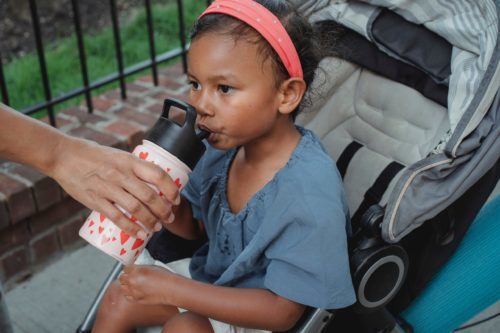Darren T. Scoggin, MD
Children’s Medical Group
Jackson, MS
One of the frequent questions pediatricians are asked in summer time is, “How much water should we be drinking?” This is a difficult question to answer because it is not a one-size-fits- all approach. There are many factors that affect how much water someone should drink such as age, activity level, and climate. For example, people who live in warmer and more humid climates have a higher liquid requirement than those elsewhere. Suffice it to say that in Mississippi during the summer, we could all be drinking a little more water! In this article, we’ll start from the bottom and work our way up.
Infants should not be given water to drink before 6 months of age. From birth through 6 months, babies should only drink breast milk or formula. Between 6 and 9 months, babies may be offered 2-4 ounces of water a day as a supplement during snack times. Nine months is a great age to begin offering a sippy cup with a few ounces of water several times a day. At 12 months, babies begin transitioning to whole milk and may take a 3-4 ounce cup of water several times a day.
Toddlers 1-3 years old need four 8-ounce cups of water daily (appx 32 ounces), but these children should still be consuming whole or reduced fat milk to help provide a balanced intake of nutrients. Older kids in preschool and early elementary ages should have about five 8-ounce cups of water daily. Older children and teenagers need around eight 8-ounce cups of water daily (totaling appx 64 ounces). Teenagers may need up to 20-40 ounces more of fluid per day depending on activity levels and lifestyle.
So what about other fluids such as juices, electrolyte drinks, and sodas? The fluid volume recommended for daily intake is from all sources, but it is important to remember that water is the best choice for hydrating the body on a regular basis. Families often ask when their babies or toddlers should start drinking juice. There actually is no “right” time to start drinking juice, and it should only be offered as a treat or very small part of an otherwise balanced diet. Juices generally do not offer a substantial nutritional benefit to be worth the cost of the extra calories and sugars they contain. They also deter children from drinking water since they taste sweet. Sodas are not a healthy alternative and should be avoided as a part of a routine daily intake. Drink packets with artificial sweeteners are not recommended for routine consumption for kids. Electrolyte drinks are important in high intensity exercise situations to replace those electrolytes lost through sweat. Most older children and teens engaging in sports should drink a low sugar electrolyte beverage if there is at least 30 minutes or more of intense activity.
Water is the best drink for children and teens, but unfortunately many people do not drink enough to satisfy their recommended intake. Even mild dehydration can lead to fatigue, mood disturbances, headaches, and learning problems. Athletes may also experience more muscle cramps and may become more easily injured. By being mindful of the recommended daily intake of water and working toward that goal, kids and teens will be set up for success in the home, classroom, and at sports!

